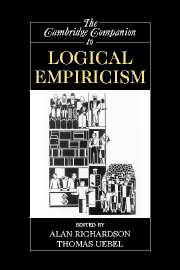Book contents
- Frontmatter
- Introduction
- Part I The Historical Context of Logical Empiricism
- 1 The Vienna Circle: Context, Profile, and Development
- 2 The Society for Empirical/Scientific Philosophy
- 3 From “the Life of the Present” to the “Icy Slopes of Logic”: Logical Empiricism, the Unity of Science Movement, and the Cold War
- Part II Logical Empiricism: Issues in General Philosophy of Science
- Part III Logical Empiricism and the Philosophy of the Special Sciences
- Part IV Logical Empiricism and its Critics
- Bibliography
- Index
- Series List
2 - The Society for Empirical/Scientific Philosophy
from Part I - The Historical Context of Logical Empiricism
Published online by Cambridge University Press: 28 January 2008
- Frontmatter
- Introduction
- Part I The Historical Context of Logical Empiricism
- 1 The Vienna Circle: Context, Profile, and Development
- 2 The Society for Empirical/Scientific Philosophy
- 3 From “the Life of the Present” to the “Icy Slopes of Logic”: Logical Empiricism, the Unity of Science Movement, and the Cold War
- Part II Logical Empiricism: Issues in General Philosophy of Science
- Part III Logical Empiricism and the Philosophy of the Special Sciences
- Part IV Logical Empiricism and its Critics
- Bibliography
- Index
- Series List
Summary
“First of all I have to say that I very much regret that you almost always write only about the Vienna Circle, so that it almost appears as if this entire philosophical movement had originated only in Vienna and Prague. Our Berlin group was just as active as the Vienna Circle, and within the movement there was never any doubt about this. Not only because a large part of the scholarly work of [the movement] was written in Berlin - along with my works there were those by Dubislav, Grelling; Herzberg also belongs here and a few younger [authors] - organizational work was also performed in Berlin. Every two or three weeks our Society for Scientific Philosophy brought together a group of 100 to 300 people for lectures and discussions; all of our problems were discussed thoroughly in my seminars and colloquia, and, last but not least, Die Erkenntnis, surely the most important link in the chain of our organizational work, was founded in Berlin and edited from there. This Berlin Circle has now been dispersed by the Hitler government, but it lives on as a virtual unit. Especially now that our work has been hit so hard by the political developments, it is important to me that this work is at least mentioned in the history of our movement.”
(H. Reichenbach to E. v. Aster, Istanbul, June 3, 1935, Archive of Scientific Philosophy, University of Pittsburgh, Reichenbach Papers (hereafter ASPP) HR-013-39-34. Translation by the author.)Thus Hans Reichenbach in a letter written during the summer of 1935 to his colleague Ernst von Aster in Giessen, by way of comment on his book Die Philosophie der Gegenwart (The Philosophy of the Present, 1935). The fact that in his Turkish exile Reichenbach was still keen to point out the independence of the “Berlin Circle” is also demonstrated by other parts of his correspondence at that time.
- Type
- Chapter
- Information
- The Cambridge Companion to Logical Empiricism , pp. 41 - 57Publisher: Cambridge University PressPrint publication year: 2007
- 1
- Cited by



